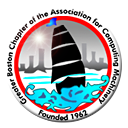Grand Challenges in Engineering for the 21st Century
The National Academy of Engineering (NAE) this year issued a report in which it attempts to identify the greatest engineering challenges humanity will face in this century. With input from people around the world, an international group of leading technological thinkers were asked to identify the Grand Challenges for Engineering in the 21st Century http://www.engineeringchallenges.org/. We've invited Ray Kurzweil, who is one of the leading authors of the report, to present some of its findings, give his impressions of the important technological trends and challenges likely to occur over the next hundred years or so, and challenge you, some of the leading students, researchers, and industry practitioners from the Boston and New England area, to help solve them.
This is a joint meeting of the Boston/Central New England Chapters of IEEE Computer Society, IEEE Robotics and Automation Society and GBC/ACM.
Kurzweil was the principal developer of the first omni-font optical character recognition, the first print-to-speech reading machine for the blind, the first CCD flat-bed scanner, the first text-to-speech synthesizer, the first music synthesizer capable of recreating the grand piano and other orchestral instruments, and the first commercially marketed large-vocabulary speech recognition. Ray has successfully founded and developed nine businesses in OCR, music synthesis, speech recognition, reading technology, virtual reality, financial investment, cybernetic art, and other areas of artificial intelligence. All of these technologies continue today as market leaders. Ray's Web site, KurzweilAI.net, is a leading resource on artificial intelligence.
Ray Kurzweil was inducted in 2002 into the National Inventors Hall of Fame, established by the U.S. Patent Office. He received the $500,000 Lemelson-MIT Prize (view the video), the nation's largest award in invention and innovation. He also received the 1999 National Medal of Technology, the nation's highest honor in technology, from President Clinton in a White House ceremony. He has also received scores of other national and international awards, including the 1994 Dickson Prize (Carnegie Mellon University's top science prize), Engineer of the Year from Design News, Inventor of the Year from MIT, and the Grace Murray Hopper Award from the Association for Computing Machinery. He has received twelve honorary Doctorates and honors from three U.S. presidents. He has received seven national and international film awards.
Ray's books include The Age of Intelligent Machines, The Age of Spiritual Machines, and Fantastic Voyage: Live Long Enough to Live Forever. Four of Ray's books have been national best sellers and The Age of Spiritual Machines has been translated into 9 languages and was the #1 best selling book on Amazon in science. Ray Kurzweil's new book, published by Viking Press, is entitled The Singularity is Near, When Humans Transcend Biology.
His book, The Age of Intelligent Machines, was named Best Computer Science Book of 1990.
Additional biographical information about Ray is online at http://en.wikipedia.org/wiki/Ray_Kurzweil.
